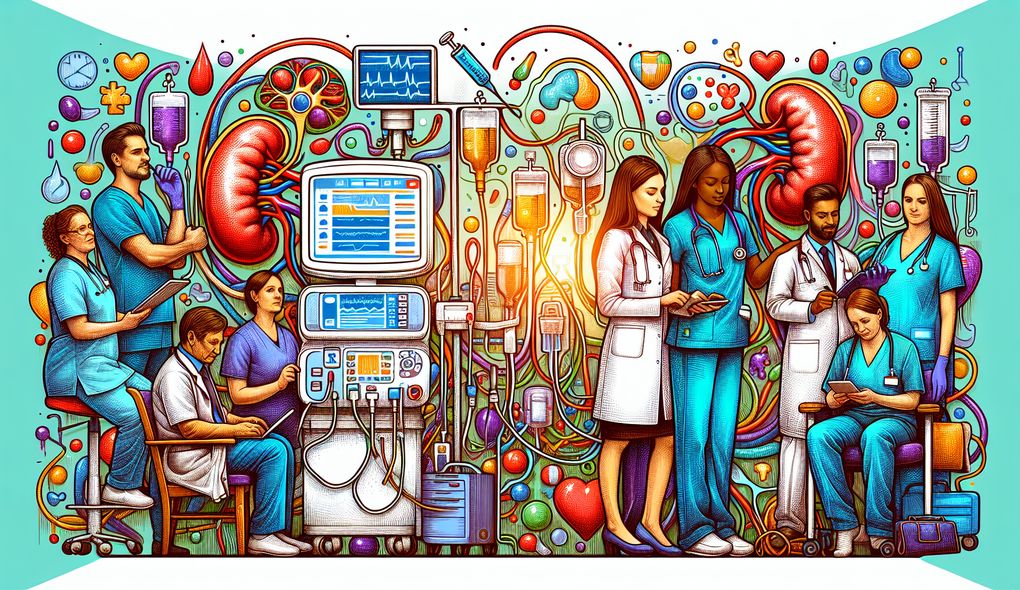How would you conduct initial patient screenings and assessments for kidney function?
INTERMEDIATE LEVEL

Sample answer to the question:
To conduct initial patient screenings and assessments for kidney function, I would start by reviewing the patient's medical history and conducting a physical examination. I would ask the patient about their symptoms, such as changes in urinary pattern or blood in the urine, and perform tests like blood and urine tests to evaluate kidney function. Additionally, I would assess the patient's vital signs and look for signs of fluid retention or electrolyte imbalances. Based on the findings, I would collaborate with the nephrologist to determine the appropriate treatment plan.
Here is a more solid answer:
When conducting initial patient screenings and assessments for kidney function, I would follow a systematic approach. Firstly, I would review the patient's medical history, paying close attention to any previous kidney-related conditions or treatments. Next, I would perform a thorough physical examination, focusing on the abdomen for tenderness or masses and checking for signs of fluid retention or electrolyte imbalances. Additionally, I would conduct diagnostic tests such as blood and urine tests to evaluate kidney function, looking for abnormalities in kidney function markers like creatinine and blood urea nitrogen levels. Throughout the assessment, I would communicate with the patient, asking specific questions about their urinary patterns, any pain or discomfort, and any other symptoms related to kidney function. I would also engage in active listening to understand their concerns and provide emotional support. Based on these findings, I would collaborate with the nephrologist to create a comprehensive care plan tailored to the patient's specific needs.
Why is this a more solid answer?
The solid answer provides more specific details and examples of how the candidate would conduct initial patient screenings and assessments for kidney function. It demonstrates their strong clinical skills in nephrology care, patient assessment and diagnostic abilities, ability to create and manage comprehensive care plans, and strong communication and patient education skills. However, it can be further improved by incorporating information about their knowledge of the latest nephrology treatments and protocols, as well as their ability to work effectively in an interdisciplinary team environment and showcase their organizational and time-management skills.
An example of a exceptional answer:
To conduct initial patient screenings and assessments for kidney function, I would leverage my strong knowledge of the latest nephrology treatments and protocols. I would start by reviewing the patient's medical history, including any previous kidney-related conditions or treatments, as well as their overall health status. This information would help me understand the patient's baseline kidney function and identify any risk factors or comorbidities that may affect their renal health. During the physical examination, I would perform a comprehensive assessment, paying attention to subtle signs related to kidney function, such as edema in the lower extremities or hypertension. In addition to routine blood and urine tests, I would utilize advanced diagnostic tools like renal ultrasound or computerized tomography (CT) scans to visualize the kidneys and detect any structural abnormalities or kidney stones. Furthermore, I would assess the patient's fluid and electrolyte balance through a detailed analysis of their lab results and collaboratively develop a comprehensive care plan. This plan would include dietary modifications, medication management, and referral to other healthcare professionals if necessary. Throughout the process, I would prioritize patient education, providing them with the necessary knowledge and resources to actively participate in their own renal health management. By fostering a collaborative and interdisciplinary approach, I would work closely with nephrologists, dietitians, and other healthcare professionals to ensure continuity of care and optimal outcomes for my patients. My strong organizational and time-management skills would also enable me to efficiently document patient assessments and interventions, making sure that all necessary information is readily available for ongoing evaluations and future reference.
Why is this an exceptional answer?
The exceptional answer goes beyond the basic and solid answers by showcasing the candidate's in-depth knowledge of the latest nephrology treatments and protocols. It demonstrates their ability to utilize advanced diagnostic tools and their strong commitment to patient education and interdisciplinary collaboration. The answer also highlights the candidate's organizational and time-management skills, emphasizing their attention to detail and dedication to providing comprehensive care. Overall, the exceptional answer presents a well-rounded approach to conducting initial patient screenings and assessments for kidney function.
How to prepare for this question:
- Familiarize yourself with the latest advancements in nephrology treatments and protocols. Stay updated on emerging research and guidelines.
- Review and refresh your knowledge of renal anatomy and physiology. Understand the key markers for kidney function assessment.
- Practice conducting thorough patient assessments, paying attention to subtle signs and symptoms related to kidney function.
- Enhance your communication and patient education skills. Practice explaining complex medical concepts in a clear and concise manner.
- Develop an understanding of interdisciplinary teamwork and collaboration. Familiarize yourself with the roles and responsibilities of other healthcare professionals involved in nephrology care.
- Improve your organizational and time-management skills to ensure efficient documentation and effective patient care planning.
What are interviewers evaluating with this question?
- Strong clinical skills with a focus on nephrology care.
- Excellent patient assessment and diagnostic abilities.
- Ability to create and manage comprehensive care plans.
- Strong communication and patient education skills.
- Ability to work effectively in an interdisciplinary team environment.
- Knowledge of the latest nephrology treatments and protocols.
- Strong organizational and time-management skills.

